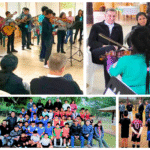Gospel according to Saint John 15:9-17:
Jesus said to his disciples: “As the Father loves me, so I also love you. Remain in my love. If you keep my commandments, you will remain in my love, just as I have kept my Father’s commandments and remain in his love. “I have told you this so that my joy may be in you and your joy may be complete. This is my commandment: love one another as I love you. No one has greater love than this, to lay down one’s life for one’s friends. You are my friends if you do what I command you. I no longer call you slaves, because a slave does not know what his master is doing. I have called you friends, because I have told you everything I have heard from my Father. It was not you who chose me, but I who chose you and appointed you to go and bear fruit that will remain, so that whatever you ask the Father in my name he may give you. This I command you: love one another.”
It is I who have chosen you
Luis CASASUS President of the Idente Missionaries
Rome, May 05, 2024 | VI Sunday of Easter
Acts 10: 25-26.34-35.44-48; 1Jn 4: 7-10; Jn 15: 9-17
The love of which Christ speaks is not much like eros, affection, friendship… or what you and I think of as charity. The love that Christ asks of us is a true journey, beautiful, yes, but full of surprises, of new challenges. C.S. Lewis rightly wrote that the only place outside Heaven where one can be perfectly safe from all the dangers and disturbances of love is Hell (The Four Loves, 1960).
But we need not feel embarrassed. Also an expert in the Law of Moses asked Christ a rather awkward question: What must I do to inherit eternal life (Lk 10: 25). Although the Master gave him a consoling answer, confirming that love of God and neighbor is everything, the truth is that the scribe committed a logical flaw: We do not inherit anything by doing something. An inheritance reflects the will of a person on the destiny of their property, with which sometimes there are unworthy and perverse heirs, who receive a precious and valuable inheritance.
Like many Jews of his time (and many of us), this expert in the Law had an arrogant and self-sufficient way of thinking, believing himself capable of doing acts of love that would merit eternal life for him. However, Christ had already explained in the Parable of the Sower that one can distinguish the fertile soil that has received the Word, by the fruits it bears, first of all, by the moral fruit of obedience to that Word. This scribe, if he had been well intentioned, should have asked: How can I be sure that I belong to the people of God, that I am one of those who are inheriting the kingdom of heaven?
That explains why Jesus continued his clarification with the Parable of the Good Samaritan, which is masterful and admirable in many ways, but now it is worth noting that in the Jewish mentality of the first century there could not be a “Good Samaritan”.
Daily supplications were offered begging God to deny them any participation in eternal life. Many rabbis even said that a Jewish beggar should refuse the alms of a Samaritan because his own money was contaminated.
But, by choosing a person of such a hated ethnic group, Christ makes us understand that in reality, the love of the Gospel, charity, is so united and so dependent on the gift of mercy, that “even a Samaritan”, accepting this gift, can be capable of living the most sublime love and more in line with what the Master lived. That is to inherit eternal life.
Peter expresses himself along these lines in the First Reading, saying: God does not make distinctions; he accepts those who fear him and practice justice, no matter what nation they are from.
Surely, we are not exactly xenophobic or racist, but are we capable of showing visible, immediate love and affection to the person who contradicts us?
—ooOoo–
Christ gives love the status of a commandment. But the truth is that we have the capacity and the freedom not to love, especially not to correspond to the love that has been given to us, even if it comes from an omnipotent being….
When Israel was a child, I loved him, and out of Egypt I called my son. But the more I called them, the more they turned away from me: they offered sacrifices to Baal and burnt offerings to idols (Hosea 11: 1-2).
Christ does not impose a new law. First, because he did not intend to suppress the richness of the old law or of any religion. And also because he wants to open our eyes to a reality: although love of neighbor, whether kind or unkind, is sometimes difficult and always requires giving one’s life, in one way or another, it turns out that the most salutary virtue is charity, as our Father and Founder used to say. It is a way of reminding us that every time I try to put myself above others, with my most esteemed opinions and desires, I am not only missing an opportunity to be an ambassador of Christ, but I am wasting and destroying my own existence with false securities.
Love is a form of spiritual breathing, something we do not only on special occasions, but in every moment. While we recognize that we do not do it that way, that should be our aspiration. Our Father Founder agreed with us and quoted St. John of the Cross: Learn to love God as God wants to be loved and leave your condition.
Even in the smallest details, in matters that do not seem important, we have the occasion to manifest our love, if it is truly inspired by divine mercy.
A young woman entered a fabric store and asked the owner if he had any noisy, crisp, white colored material. The owner, a bit surprised, searched the inventory and finally found two rolls of fabric that fit the description. As he cut the fabric to the customer’s specifications, he was curious and asked why the woman wanted such an unusual and noisy fabric. The young woman replied: You see, I’m making my wedding dress and my fiancé is blind. When he walks down the aisle, I want him to know when I’ve arrived at the altar, so he won’t feel uncomfortable.
—ooOoo—
Among those whom Jesus calls “his friends” were Simon, a zealot revolutionary; Peter, a person of difficult character; Matthew, a hated tax collector; Judas, a traitor; and two ambitious and somewhat obstinate brothers (James and John). Of course, Christ’s criterion for choosing his friends was neither affinity, nor complementarity, nor common interests, as many social psychologists would claim. But since it was a community with all kinds of personal and interpersonal difficulties, we too have the assurance that we can be chosen as his friends, in spite of any limitations or vices that characterize us.
The sign of this friendship is clearly defined by Christ: I have called you friends, for all that I have heard from my Father I have made known to you. And what is it that Jesus heard from his Father?Essentially, the pain of unrequited love that we mentioned earlier. When we are able to communicate, listen and share the “pain of love” (as our Father and Founder says), then we can speak of true friendship.
A story is told of a very generous and uncultured old woman who had spent seventy years as a servant of a noblewoman, from her childhood to her old age. The mistress had passed away and, in an effort to console this elderly servant, a neighbor said to her: I am very sorry for the death of Doña Mercedes. You must miss her very much. I know you were very, very close friends.
Yes -said the maid- I am very sorry she died, but we were not friends.
Yes – answered the neighbor – I know you were. I have seen you laughing and talking together many times.
That’s right -replied the maid- We have laughed together and talked a lot, but we were only ‘acquaintances’. You see, madam, we have never shed tears together. I believe that people have to cry together before they can consider themselves friends.
This friendship of Christ, characterized by making known to us what he hears from the Father, is not about a matter of information or mysterious secrets. It is about his response to our small but sincere act of attention, an act of trust in commissioning us to make visible his way of loving.
He was not impressed by the crowds that sometimes listened to him, so he repeats the old and harsh words of the Old Testament: Go, and say to this people: “Listen well, but do not understand; Look well, but do not understand” (Isaiah 6:9). He was admired by many, who were grateful for healings and other wonders, even changes in the moral life of some. But what the Master expected and expects today is not simply that we should admire him and become somewhat better, but that we should go and bear fruit, and that our fruit should remain.
If we are truly capable of making friends, which is the beginning of our apostolic action, of course we will bear fruit that remains. And it remains eternally, beginning with a special reception in heaven: Therefore, I advise you to make friends using the riches of this world. Thus, when the day comes for you to leave them, there will be one who will receive you into the eternal mansion (Lk 16: 9).
In this life, one of the fruits that Christ mentions today is that our joy will be complete. But it is so; Christ’s love reaches all people. No matter how much I may love one, two, or many human beings, if someone remains outside of my love, if I do not find a way to manifest my friendship to them, I cannot be completely happy.
In fact, we all have some experience of having lived a relationship of friendship with someone and later contemplating with pain how that relationship turns into indifference or even hatred. Human friendship, the one we can live with our strength, is quite limited. The friendship that Christ allows us to live, if we imitate him, does not place conditions on others and is always the fruit of a new, original inspiration. Every friend is different.
—ooOoo—
It may seem that Christ’s discourse today is contradictory: on the one hand, He calls us friends and on the other hand, he tells us that what we have to do is to obey his commandments and do what He commands us. It is not a matter of understanding these phrases intellectually. Rather, it is to verify and declare how this is indeed the case in my personal life. We are powerless to truly love if we do not count on Him, that is why we need to obey, to be faithful to His instructions, to obey His commandments and especially to be faithful to the Evangelical Counsels: they are the gateway to charity.
We can see in the Old and New Testament how God calls Abraham a friend (Isaiah 41:9), and the Lord spoke face to face with Moses, as one does with a friend (Exodus 33: 11). And today Jesus reminds his disciples that they are friends. But it is not enough. We have to be aware and we have to tell and share with others the story of our friendship with Christ. It is a true story, illustrating how it is one thing to tell someone that I am his friend and another thing for that person to recognize me as his true friend.
Our friendship with Christ is like the friendship Moses, Abraham, Peter, or James, who asked Jesus to send fire on a Samaritan city, had with God. Again and again we are welcomed and forgiven. If it is good to remember our mistakes, it is above all to bring to mind how the corresponding forgiveness took place, how Providence placed the right person, the right event, the right feeling to give us the assurance that we will never be rejected, despite having responded NO, in many ways, to the divine voice.
_______________________________
In the Sacred Hearts of Jesus, Mary and Joseph,
Luis CASASUS
President













